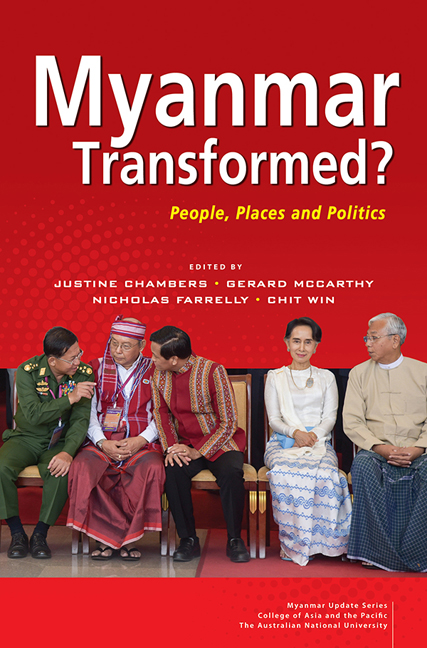Book contents
- Frontmatter
- Contents
- List of Tables
- List of Figuress
- Acknowledgements
- Contributors and Editors
- Part I Introduction
- Part II People
- 2 Documenting Social and Economic Transformation in Myanmar's Rural Communities
- 3 Social Protection in Myanmar: A Key Mechanism for Political Legitimacy?
- 4 Health Service Delivery and Peacebuilding in Southeast Myanmar
- Part III Places
- Part IV Politics
- Part V Epilogue
- Abbreviations and Key Terms
- Index
3 - Social Protection in Myanmar: A Key Mechanism for Political Legitimacy?
from Part II - People
Published online by Cambridge University Press: 12 February 2019
- Frontmatter
- Contents
- List of Tables
- List of Figuress
- Acknowledgements
- Contributors and Editors
- Part I Introduction
- Part II People
- 2 Documenting Social and Economic Transformation in Myanmar's Rural Communities
- 3 Social Protection in Myanmar: A Key Mechanism for Political Legitimacy?
- 4 Health Service Delivery and Peacebuilding in Southeast Myanmar
- Part III Places
- Part IV Politics
- Part V Epilogue
- Abbreviations and Key Terms
- Index
Summary
Myanmar is currently undergoing significant political and social reforms, in a context of ethnic and religious diversity, growing inequalities and ongoing armed conflict. Critical to the success of reforms, and to the ongoing peace process, is sustained political legitimacy. Where previous governments have sought legitimacy based on notions of security, the challenge for current and future governments is to build legitimacy on a foundation of equitable pluralism. In such a context, social protection offers a pathway to build public trust, and establish legitimacy based on consent, consistent with social contract theory which obliges mutual benefits and responsibilities between the state and citizens. Although Myanmar has a rich tradition of non-formal social protection and norms of reciprocity, the wider implementation of social protection is still in its infancy. However, the policy direction and implementation approach followed in developing social protection mechanisms are crucial to the success of building public trust and a sustainable peace process. This includes ensuring adequate state funding, potentially through: appropriating mineral revenues; giving sufficient attention to inequalities; identifying and building on existing repositories of social capital; facilitating a more devolved and localized approach to planning and delivery of social protection; and developing more localized approaches to accountability and transparency.
This paper is organized in five sections and is based on existing literature, reports by relevant government departments, development partners, and media as well as personal observation through interactions with ordinary citizens. The first section outlines the key issues of political legitimacy in the Myanmar context, including why political legitimacy is important in the current power structure in Myanmar. The second section considers the “trust deficit” which currently challenges the development of political legitimacy in Myanmar. The third section introduces the general concept of social protection, and the fourth section summarizes historical trends and the current status of social protection in Myanmar. The final section draws on both international evidence and evidence from Myanmar on how social protection acts to build trust and legitimacy and concludes with recommendations on the future direction of social protection in Myanmar, in particular approaches to social protection policy which can contribute to building public trust.
- Type
- Chapter
- Information
- Myanmar Transformed?People, Places and Politics, pp. 53 - 84Publisher: ISEAS–Yusof Ishak InstitutePrint publication year: 2018

